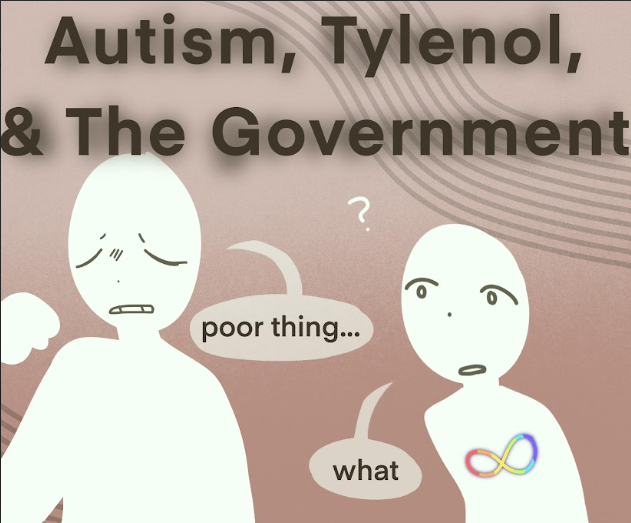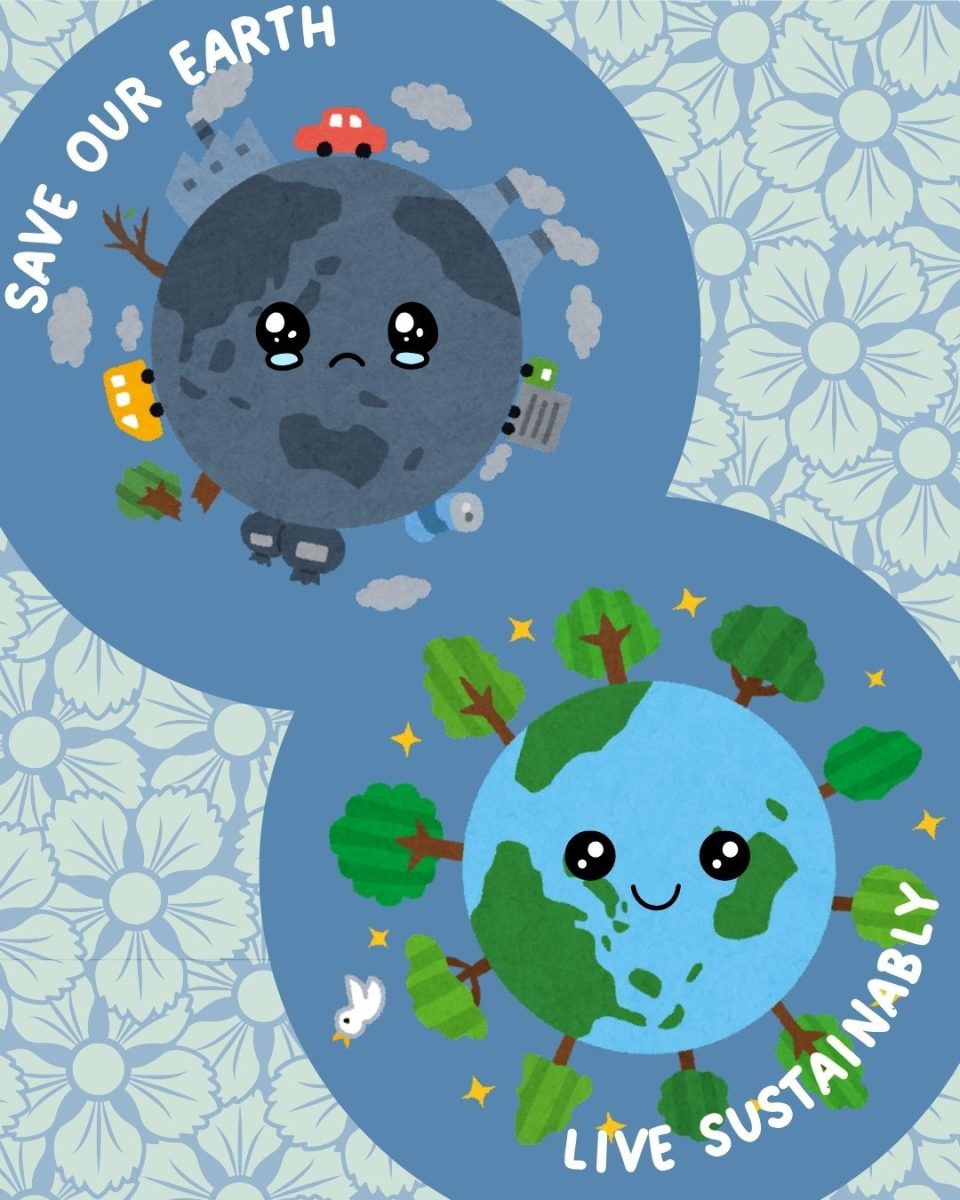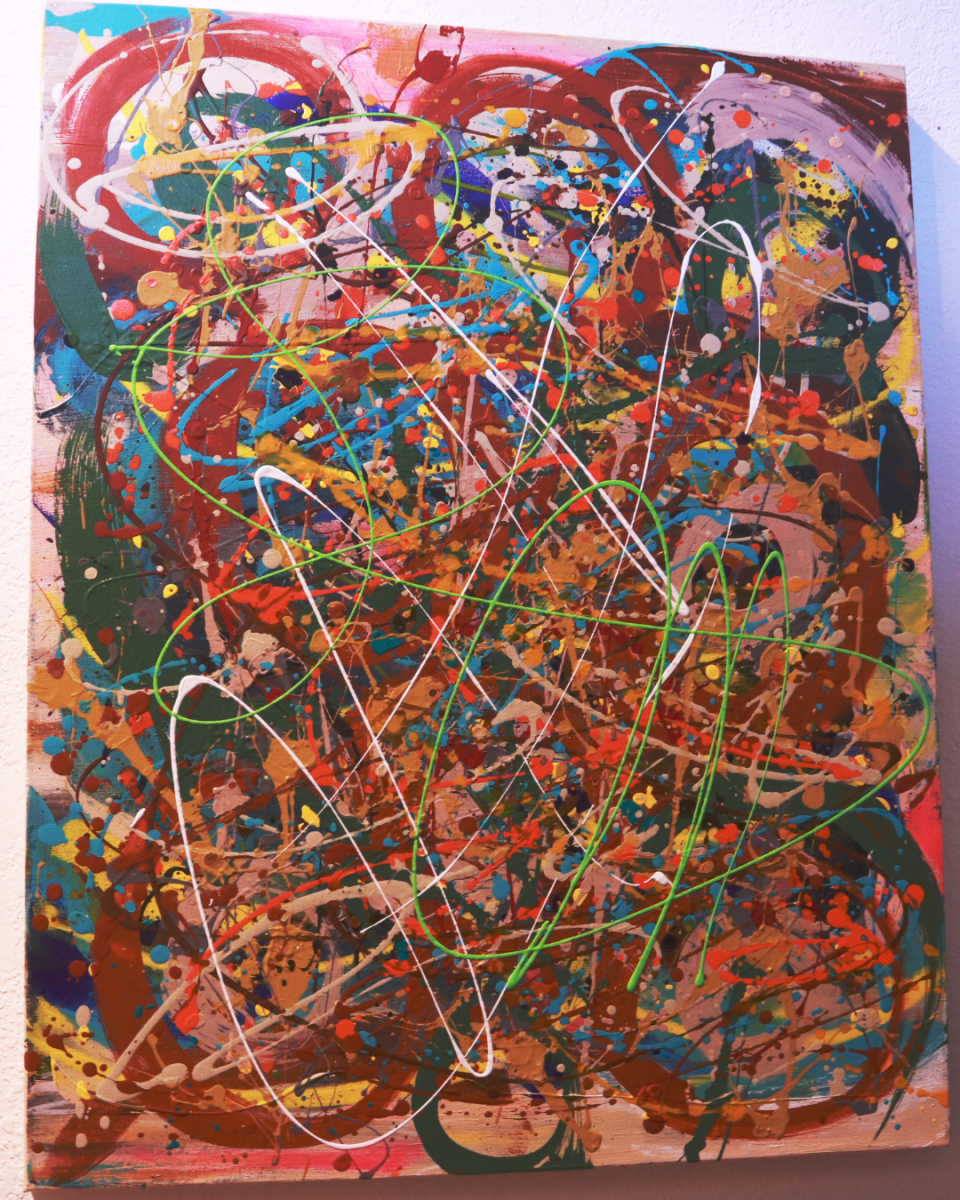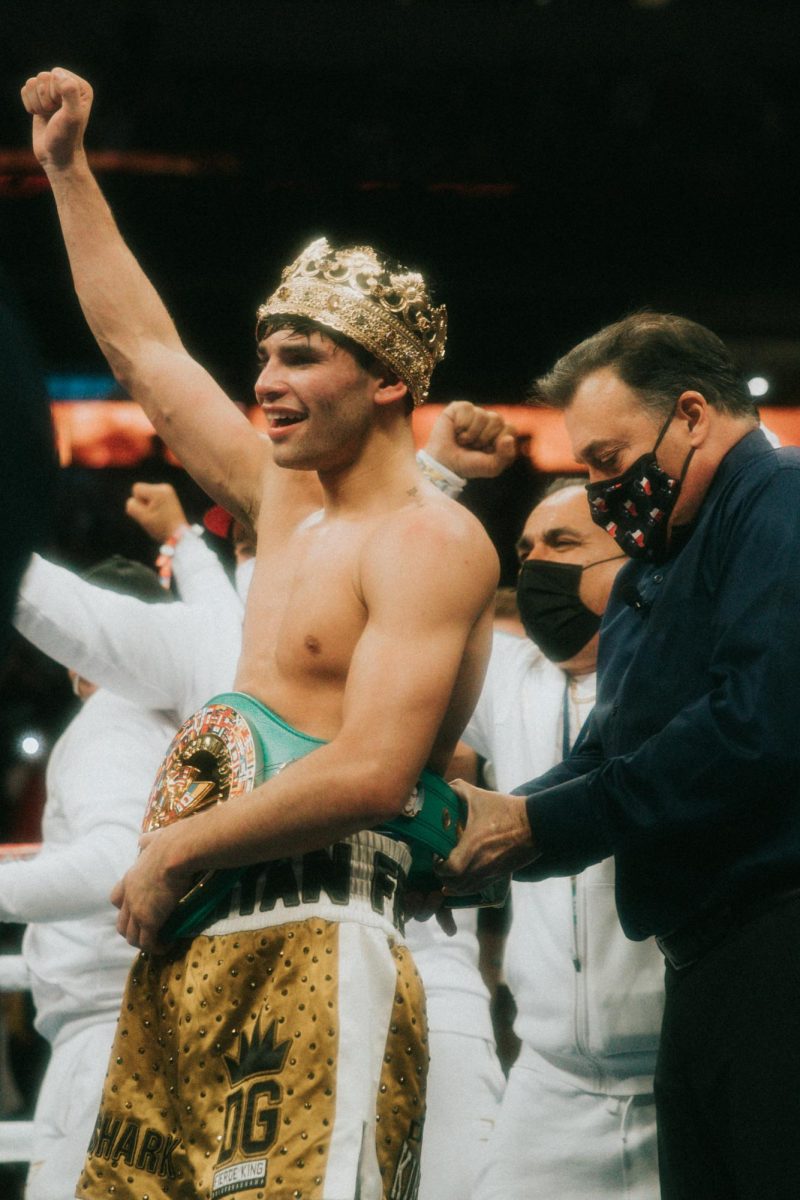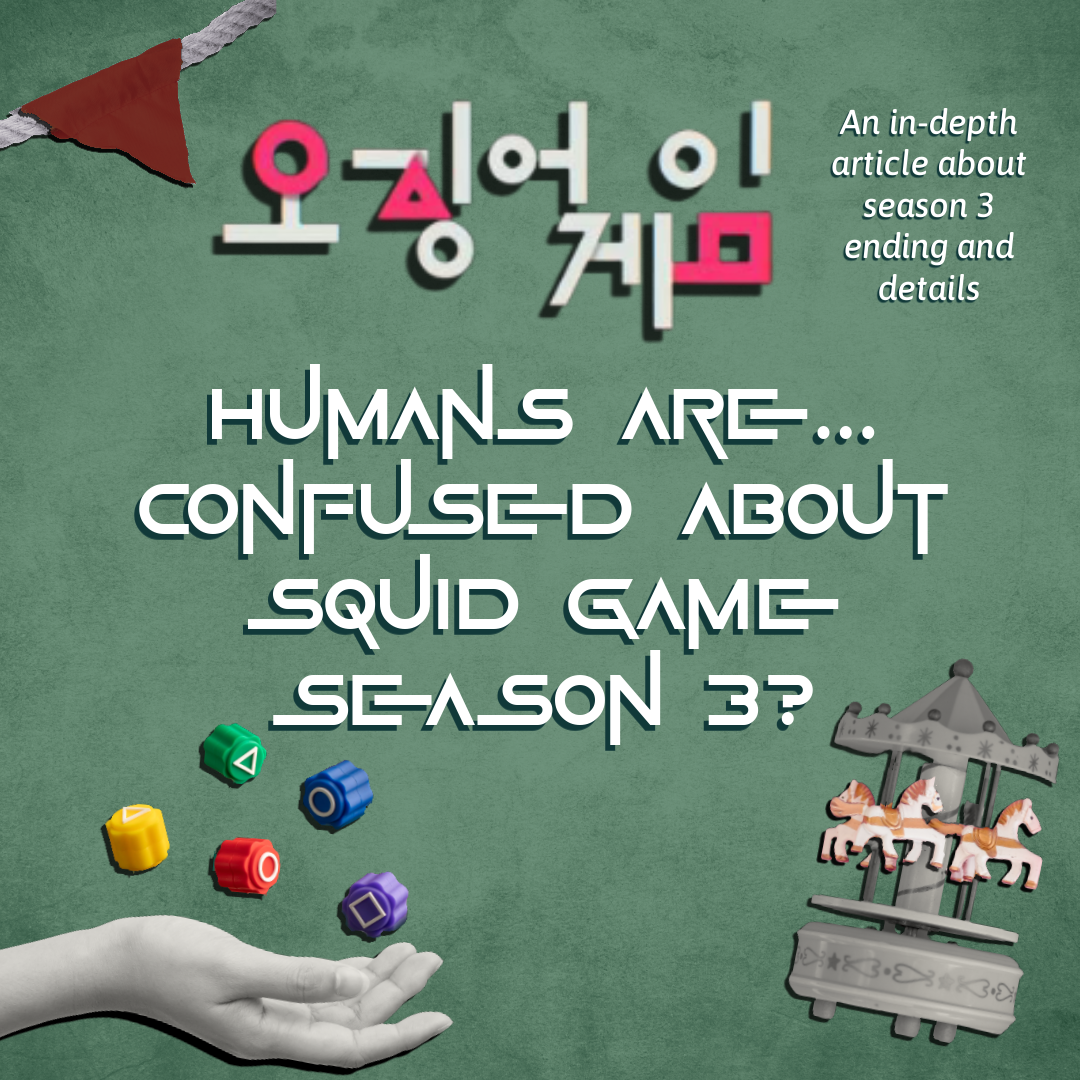*SPOILERS AHEAD WITH MENTIONS OF SUICIDE AND MURDER. READ WITH CAUTION.*
On September 17, 2021, the global phenomenon of Squid Game, directed by Hwang Dong-hyuk, hit Netflix’s catalog. Since then, the show has been nominated for and won numerous awards like the Golden Globes, Peoples’ Choice Awards, etc. Its first 2 seasons currently stand at #1 and #2 of the Top 10 Most Popular Non-English Shows on Netflix with 265.2 and 192.6 million views, respectively.
On June 27, 2025, its third and final season aired and is currently holding the #1 most-watched television series in 93 countries. However, fans are left having mixed opinions and confusion with what the final season has to offer. With the series coming to an end and many details and meanings behind it, we’re here to explain some parts of Squid Game.
Humans are…:
“We are not horses. We are humans. Humans are…” With player 456, Gi-Hun, not finishing the last few words of his “Humans are…” speech, it gives the audience and the VIPS watching to make up what they think humans in society are. The full sentence that Gi-Hun was trying to say is left off with an action instead of an adjective. It gives the saying that actions speak louder than words, a more powerful meaning. The director, Hwang Dong-Hyuk, purposefully left it as unfinished rather than a defined statement. He stated, “People are far too complex to be defined categorically.” The ending quote also lets the audience interpret and feel impacted by the series as a whole.
Le Jung-Jae, the actor who portrayed Gi-Hun, described his struggle to convey the emotions of the character. “As the actor, do I need to convey the emotion more explicitly? Or instead, should I, like the writer, who’s also our director, find a way, through whatever kinds of different choices, to make my performance in that final scene more open-minded?,” Lee said.
Gi-Hun’s Sacrifice:
Many fans are saying that the main character, Gi-hun’s, death was unreasonable or unnecessary, but it actually brought the story full circle. Gi-hun was initially an average guy living in the lower bracket. In the beginning, Gi-hun was a careless gambler and had lost custody of his daughter. After he joined Squid Game, he quickly realized its brutal nature and tried to navigate it with kindness in Season 1. However, as the sole winner, he watched his old friends, and even new ones, die before his eyes and was forced to carry the guilt into his real life outside the games.
Throughout the show’s 3 seasons, 456’s character makes multiple attempts to help others. In season 2, we learn he has spent his time searching for the recruiter and selflessly tries to end it for good by rejoining. He plans a full-out rebellion against the system but ultimately fails, taking numerous more lives. Gi-hun recognizes that he can’t stop the games because of the deep-rooted corruption of human nature. The players slowly replace their morality with greed as the cash prize’s potential hangs over each human body.
He loses hope and tries to downplay the guilt, leading him to kill player 388, who couldn’t bring back the magazines. Geum-ja(149) then reminds him of his true intentions, and begs him to care for Jun-hee’s(222) baby. After that, he holds on to his promise until the very end of his life. His kind human nature stays with him no matter what, even when given the free chance to kill off the other players in their sleep. This was the ultimate test.
When standing on the final circle platform, with Myung-gi (333), he offers to sacrifice himself so that Myung-gi and his baby can live, but soon realizes the greedy and money-hungry person player 333 is and kills him. Gi-hun saved the baby from its eventual fate with 333, and then makes the ultimate sacrifice of the show, himself. He could easily have thrown the baby off, but he chose to reject the brutal principles of Squid Game and protect the innocent. Something he has been doing all along throughout every season. He remained the person he always was at heart till the very end: good.
Player 222’s Victory:
Player 222’s baby winning the 2024 Squid Games has sparked different emotions in fans; however, this was probably intentional. In episode 2 of season 3, player 222, with the help of players 120 and 149, gives birth to her child. Player 149 says in episode 3, “But that baby hasn’t done anything wrong. It’s not her fault she was born in this hellhole.” Unlike the other characters, the baby did not make any mistakes or choices in life to lead to be in the Squid Games. This foreshadows the baby’s eventual win. Player 222’s baby is a prime symbol of human innocence and humanity. She was born into a corrupt system, unable to make decisions or fend for herself. She had done nothing wrong to deserve the torment of Squid Games, in juxtaposition to the other “good” characters in the show and their unique paths that led them to the games. She even became a player solely for the enjoyment of the VIPS.
The countless times the series showed the voting scenes and the odds of those who voted “O” against those who voted “X” in the voting sessions showed the impact bad deeds have against good people and tested their limits. However, Gi-hun, whose humanity fluctuates and grows, ultimately sacrifices himself for the baby, symbolizing that he sacrifices himself for humanity. He knows that if he had won the games again, there would have been no point in anything he had done up until that moment. He would have given the VIPS the satisfaction they wanted, and the games would have continued.
When Gi-hun is called up to the Frontman’s office, before leaving, In-ho asks, “Do you still have faith in people?” and Gi-hun gives no response. Allowing the baby to win, he retained his morality until the end and allowed the baby the chance to live a good life and do good things. In-ho watched and understood Gi-hun’s final, nonverbal answer. The baby winning represents that even in a bleak, cruel world, there can still be hope for the future.
After the Games Ended:
After the actual games ended in the series, we see clips of some of the characters’ lives after the games. What was that for? Gi-hun’s death represents the retention of his humanity and how he constantly tried to do good despite the hatred of the world around him. The final few minutes of the show reflect that. In season 3’s finale, we see Sae-byok’s brother finally reunite with his mother. In Season 1, Sae-byeok(067) asks Gi-hun to help her brother, and in that season’s finale, we see Gi-hun give her brother to live with the mother whose son died in the games. Gi-hun’s humanity and “goodness” paid off and benefited the lives of others, who will hopefully pass it on.
We also see Guard 011’s story come to a close. She burns the files of the players, and in doing so, she reads her file, which declares her daughter as “dead.” Having lost all hope, she is ready to kill herself until she sees Gi-hun sacrifice himself for the baby. Seeing Gi-hun’s act of humanity, she regains hope for society and that there still could be good in it. After leaving the island, she visits player 246(whom she saved) at his job. She finds out his daughter has safely recovered from cancer, which was why he joined the games in the first place, due to the help of others. Soon after, she receives a call saying that traces of her daughter could be found in China, and her final scene is her taking a flight there, implying that she has found her daughter at last. The guilt she felt after abandoning her daughter was profound and yet sought it in her heart to help reunite another parent with theirs, thus rewarding her in good karma by finally reuniting her with her child.
The fans are well aware of the detective’s story throughout each season, and a common response from fans is that his contribution was “useless” to the plot. He found the island after everyone had already died. However, due to the director’s pursuit to showcase the “real world” as it is, it could be deduced that Jun-ho is meant to represent the average person fighting for justice and truth in a corrupt world that plays against them. He is given few resources, and those that were given to him are controlled by Squid Games themselves, leading him in circles. Also, in the end, we see him receive the winner, Jun-hee’s baby, along with the money. The frontman left her there as he knew he was trustworthy and reliable enough to provide the baby with a good life. We also see the frontman give Gi-hun’s daughter in America his leftover money and tracksuit. This shows how Gi-hun helped In-ho remember that there is still good in the world and brought back some of his own. The actor who played the character, Lee Byung-hun, said, “Front Man has that last piece of benevolence remaining inside of him,” to questions regarding his actions at the end of the series.
Sadly, many fans are mad about the series not having a different ending, like if the detective had gotten there earlier, if Gi-hun had survived, or even if the rebellion had worked. The director of Squid Game knew this and revealed in a press interview in Seoul that originally the story was going to end on a happier note, but soon asked himself, “What is the story I truly want to tell?” and how “the world has gotten even worse. Economic inequality has deepened[…]If things continue this way, the future looks truly bleak. That’s a reality I felt needed to be addressed,” said Hwang Dong-hyuk. As for the special appearance of Cate Blanchett as the American Squid Game recruiter, the director spoke out, saying that he is done telling the story he wanted to tell. If anything more comes out, it would be a spin-off or side story.
Symbolism:
Squid Game uses symbolism reflected throughout the series in numerous details. One motif is comparisons drawn between the contestants and horses. For example, in season one, the main character, Seong Gi-Hun (Player 456), has a gambling problem betting on horse racing. We find out later in the season one final episode that the Frontman (Hwang In-Ho) compares the games to betting on horses. Just like Gi-Hun bets on racing horses, people will bet on the players in the game for entertainment.
The character, In-Ho, He states, “You people are horses, horses at a racetrack. We bet on you.” In some methods of horse racing, when a racehorse is no longer useful, they’re slaughtered, which adds a deeper meaning to how the show compares people to racehorses. However, these horses aren’t just used to be compared in speech. In scenes shown in the series, whenever a player is being represented to the VIPS in the games, they use wooden horse pieces. In addition, horse masks are seen at the Halloween party pursuit and in the Mingle game.
The reference to horses doesn’t just stop there. It’s also a key point in the final words of the main character, Gi-Hun. He says. “We are not horses. We are humans. Humans are,…” once again, referencing that betting on humans shouldn’t be the same as betting on humans.
Capitalism & Social Morality:
Squid Game’s portrayal of social morality and capitalism is shown well throughout the series. Squid Game reflects the socioeconomic inequality of not only South Korea but the rest of the world as well. Multiple actions throughout the series build the theme of capitalism.For sheer entertainment, the wealthy gode desperate people to fight each other to the death in an effort to improve their status. Squid Game puts money profit over human life.
Squid Game also shreds the capitalist myth that hard work guarantees prosperity. This is shown when players could’ve worked their hardest throughout the games, only to die. Another way is how players got into debt, especially player 456, Seong Gi-Hun. During season one, we find out that Gi-Hun was laid off from his work. This was a nod to South Korea’s 2009 Ssangyong Motors plant strike, where the company had laid off many workers.
The show presents multiple ethical dilemmas, testing concepts of social morality. VIPs bet on live humans for entertainment, but those humans got themselves into the situation and chose to be there. Is more wrong than the other? People die, but their organs are harvested to save others. The games were created by Oh I’ll-Nam and carried on later by Hwang In-ho, who used the games as an ego-booster to show that theres “bad” people like them in society. In the midst of the worse of humanity, glimpses of the best of humanity are shown with characters sacrificing themselves. For instance, in the season 3 finale when Gi-Hun sacrifices himself for Player 222’s baby.
Character Parallels:
There are some incredibly heart-wrenching parallels between characters in this season. The most obvious one is Gi-hun and In-ho. When In-ho calls Gi-hun up to his office, he presents him with a knife to allow him to kill off the other players and win the games with the baby. It is revealed that when In-ho played the games in the past, the frontman (who was player 001 in Season 1) gave him the same opportunity. However, Gi-hun, whom the audience knows is a good person, almost takes In-ho’s advice and tries to kill Player 100. The scene builds so much tension as it cuts back and forth from Gi-hun and In-ho in the same position until Gi-hun sees Sae-byeok and is reminded that this is not who he is on the inside. He backs off from player 100, and In-ho is left staring down at a dead body. The parallel of the retention of morality between the 2 characters is powerful to the overall meaning of the show. In-ho became the Frontman to boost his ego and prove that good people don’t exist at their core, but Gi-hun resisted that time and time again until the very end, leading to his bittersweet demise.
There is another parallel between characters that left fans a bit infuriated. Jun-hee(222) holds her baby for the first time while Geum-ja(149) hugs her son for the last time. At the end of the beginning of episode 2 of season 3, Player 149 and Player 007 talk about the upcoming game, hide and seek, and their roles. They discuss who should be in which role and end up revealing a bit of Player 149’s past with her abusive husband. It could be implied that when 007 got violent towards Jun-hee and her baby, Player 149 saw a piece of her husband in her son and herself in Jun-hee. She knew that her son wouldn’t have been able to survive, and the baby was a new, untainted life. In a split second, she stabbed her son, leading to the guards killing him. It was obvious she didn’t want to do that to her own child, but even though she had only known the girl and her baby for a little time, she chose to protect an innocent life. Even the director himself said, “I want to throw all of these characters into impossible moral dilemmas[…]pushing each character to their limits to see what decisions they make.”
Another known parallel in season 3 is Jun-hee’s death scene when she lies dead after jumping from the ledge in “Jump Rope.” The floor is made from a design of a random pattern of plastic flowers. Likewise, her baby, whom Gi-hun carried over to the surviving side, lies on a bed of fresh, presumably real, flowers. Fans noticed this and made the connection quickly, symbolizing the hard, cold fate of Jun-hee and many of the other players and the fresh, new beginnings of the baby.
Review:
Netflix’s original series, Squid Game, has become a global phenomenon known for its portrayal of economic struggles and human morality. The series provides characters to empathize with, episodes with action, and a glimpse into our world and generation. Though the series came to an end, the meaning behind its ending will serve as a powerful commentary on capitalism, human desperation, and the moral choices people will make to survive.



